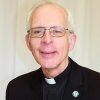 Recently I had the privilege of accompanying a group of deacons, their wives, a Maryknoll benefactor and a retired bishop on a two-week mission immersion experience to Kenya and Tanzania. During this trip, I personally re-discovered what it means to be at home in mission.
Recently I had the privilege of accompanying a group of deacons, their wives, a Maryknoll benefactor and a retired bishop on a two-week mission immersion experience to Kenya and Tanzania. During this trip, I personally re-discovered what it means to be at home in mission.
As our group visited Christ the King parish in the vast and poor informal settlement of Kibera in Nairobi, Kenya, where I had worked with the Guadalupe Missioners from 2000 until 2003, I was repeatedly greeted by old friends with these Swahili words, “karibu nyumbani,” meaning “welcome home.” In responding to these greetings, as well as to the questions about when I would be returning there to live again, I realized that it was no longer I who was identifying Kibera as my home but rather the people there who articulated my belonging among them.
A few days later in our travels to visit some of the ministries of Maryknoll Sisters, Maryknoll Lay Missioners and Maryknoll Affiliates, we were welcomed to Uzima Centre in Mwanza, Tanzania, by Lay Missioner Joanne Miya. In sharing with us how lay missioners are becoming increasingly more responsible not only for funding their own ministries but also for part of their personal living expenses, Joanne was asked by one of our group members what she needed. She replied very humbly, “I have all that I need and want here.” After 34 years in mission, Joanne freely and proudly names Tanzania as her home.
Repeatedly since his election in March 2013, Pope Francis has both implied and stated clearly that being at home in and with mission is essential for living God’s mission, wherever we find ourselves. The pope is urging us all to claim and proclaim that God’s mission is at the very center of our being as Church and as individuals.
In his recent apostolic exhortation, “The Joy of the Gospel” (Evangelii Gaudium), Pope Francis writes, My mission of being in the heart of the people is not just a part of my life or a badge I can take off. … I am a mission on this earth; that is the reason why I am here in this world.”
Might this identification be a part of what it means for us to be created in God’s image and likeness?
Robert Jalbert, M.M.

